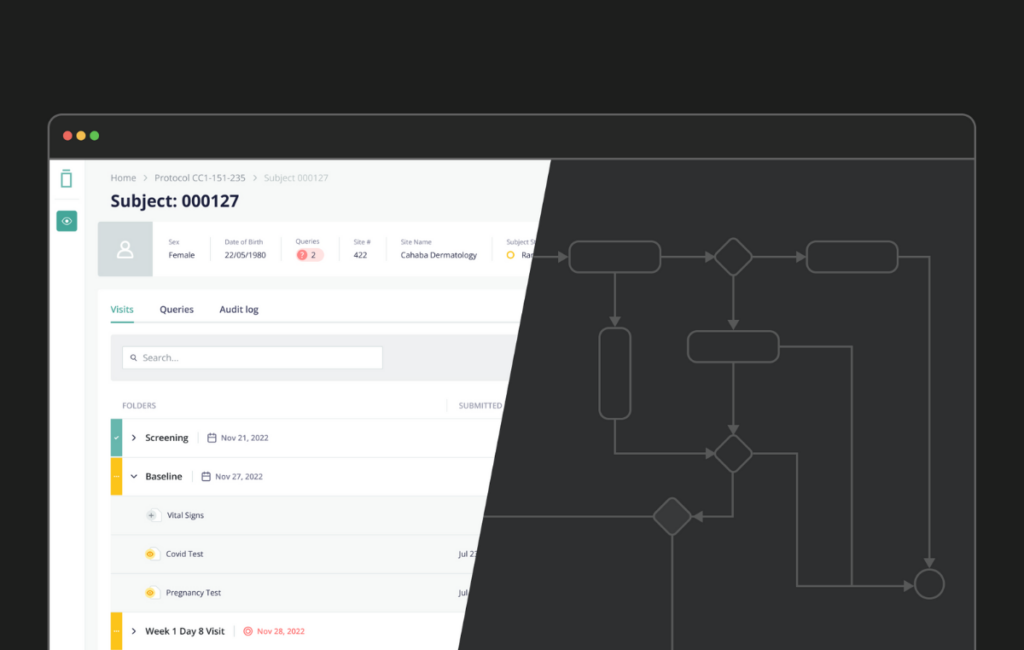An estimated 3 million Americans were diagnosed with inflammatory bowel disease (IBD) as of 2015, with the prevalence in the United States trending upward in recent decades. IBD is a gastrointestinal (GI) disorder that presents either as ulcerative colitis (UC) or Crohn’s disease, which are primarily characterized by chronic inflammation of the large and small intestines, respectively. Of the two, UC is far more prevalent in the adult population, and common symptoms include diarrhea, abdominal pain, and bloody stools with or without mucus. Depending on the disease’s extent and severity, clinicians may consider surgical interventions like an ileostomy or various anti-inflammatory medicines, including sulfasalazine, aminosalicylates (ASA), glucocorticoids, and biologics. In this article, we’ll dive into the challenges of ulcerative colitis clinical trials and three strategies to overcome them.
Challenges of Ulcerative Clinical Trials
Although gastroenterology research into IBD has helped expand the availability of therapeutic options through numerous UC and Crohn’s disease trials, patient remission rates have remained at a modest 20-30%. Given the limitations of traditional approaches to GI trials, there is a growing need for alternative drug development strategies to overcome major challenges affecting ulcerative colitis clinical trials. Among the most prevalent include recruitment difficulties due to increased trial complexity, creating effective study designs, and developing objective but feasible endpoint measures.
The good news is that sponsors and contract research organizations (CROs) can implement targeted approaches to address these inevitable obstacles early on. Read on to find out the top three strategies your clinical project team can adopt to find greater success in ulcerative colitis clinical trials.
1 | Optimizing Study Designs to Combat the Placebo Effect
Ulcerative colitis clinical trials have historically been associated with high placebo response rates, with one 2016 meta-analysis finding them to be 22-33%. The same systematic review reported greater trial duration and frequency of study visits to be associated with higher rates. Another 2023 study also implicated normal levels of C-reactive protein and albumin, as well as milder endoscopic severity. These can be valuable considerations to keep in mind when developing study designs for an optimal assessment of therapeutic efficacy. For example, sponsors can use existing research on predictors of the placebo effect in ulcerative colitis clinical trials to influence the eligibility criteria chosen to select an appropriate study population.
Regulatory standards for clinical UC drug development do recommend the use of a parallel comparator arm, but in a non-inferiority approach with an active treatment rather than a placebo. Ideally, 5-ASA medications should be selected for comparison against first-line investigational therapies, given that they are the current treatment standard in IBD. However, many pharmaceutical companies may still opt for placebo-controlled trials because non-inferiority designs require significantly larger sample sizes, as well as longer follow-up periods, which may not be feasible. To get around this, exploring adaptive study designs or using Bayesian modeling to estimate placebo response may help reduce the need for more participants.
2 | Prioritizing Collaboration and Simplicity in Study Recruitment
Increasing incidence rates of IBD have led to a boon in drug development efforts for UC in recent decades. However, the resulting availability of UC clinical trials and medications has contributed to an ongoing downturn in recruitment rates since the 1990s. Given the competitive nature of UC study recruitment, sponsors can use their own and a GI CRO’s resources to help invest in training newer investigators, rather than continuing to rely solely on patient pools of previously participating sites.
Collaborations with patient advocacy groups are also a valuable source of real patient insights into effective education and engagement strategies, as well as protocol design burdens. However, the most important relationship for sponsors to leverage against UC recruitment challenges is the one with their chosen CRO partner. The right company will not only help design a tailored patient recruitment playbook but can also offer other unique solutions to simplify trial activities. These can include decentralized clinical trial capabilities, quality site networks, or extensive patient-friendly trial technology to improve enrollment and retention.
3 | Developing Endpoints: Balancing Relevance and Feasibility
There is a significant challenge in developing endpoints that are not only appropriately representative of UC clinical outcomes, but also not so ambitious that it adversely impacts feasibility. Generally, the combined use of clinical, endoscopic, and histological measures for the primary endpoint may help reduce high placebo response and remission rates. Opting for histological endpoints, especially to evaluate mucous healing, has been encouraged for ulcerative colitis clinical trials by the U.S. Food and Drug Administration because it has been previously associated with a lower risk of disease relapse, hospitalization, cancer, and surgery. The use of well-defined patient-reported outcomes may yield additional data to gain a full picture of clinical outcomes in this population.
Vial GI CRO
Vial is a full-service GI CRO that recognizes the central role of digital innovation to address the widespread challenges of today’s GI clinical research landscape. Trusted by leading sponsors, our specialized teams deliver shorter study timelines, quality affordable services, and a clinical trial experience that puts you first. Contact a team member today to discover how we can help with your next ulcerative colitis clinical trial!



